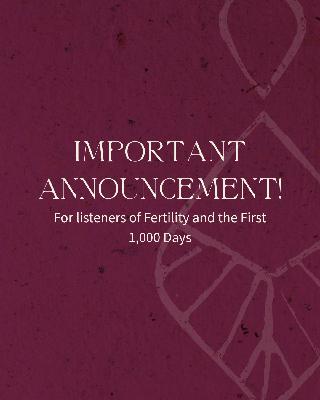The Micronutrients Series - Macro Minerals Pt1
Description
Hello, you are listening to Katy Bradbury, a registered nurse and nutritional therapist. today's podcast episode is called Micronutrients Series, Macro Minerals, Part 1.
So hello, and welcome to the show today, I'm really happy to be talking to you again. It's been a couple of weeks. So, if you're a keen and regular listener, you might have noticed that episodes over this time have been a touch sporadic. And that is, by no means a reflection on my desire to come and speak to you. It is just a reflection of how busy this summer has been in being away. And quite frankly, me just not being organised enough to pre-record episodes too, you know, so that I'm releasing them while, while I'm away. So accept my apologies for that. I'm actually going to be getting back on to the micronutrient series, this week. I took a little break from it with the last episode and shared a few strategies in the last episode I recorded a couple of weeks ago on how, how to navigate some of the trickier times some of the trickier points in the road when you are on this fertility journey. So, it just came at a time for me when quite a lot of the people that I was talking to were at a bit of a crossroads with regard to their fertility journey. And I just thought, Look, if I'm talking to a lot of people for whom this is relevant for right now, I'm sure it's going to be helpful for a lot of you. So if you did listen, I hope that you found it helpful. It involved a practical exercise. So please let me know how you got on with that I love hearing from you can always contact me on Instagram @katybradburyhealth or by email on support@katybradbury.com.
But anyway, without further ado, I'm going to continue talking about micronutrients this week, which for me as a nutritional therapist it is a super exciting topic. And I hope that I've been able to keep your interest in talking. As I have so far I've covered the range of different vitamins. So I've covered the fat soluble and the water soluble vitamins as they pertain to fertility and getting and staying pregnant. So hopefully, what I've shared so far has been interesting and informative. And I'm going to move on now from the vitamins to cover some of the minerals and what I've decided to do is divide it into what we call the macro minerals. And, and then some of that some of the smaller minerals, the trace minerals, so when we're talking about macro minerals, we're talking about the larger minerals, so minerals that we might typically measure in milligrammes rather than microgrammes. And there are four main macro minerals, and they are calcium, magnesium, sodium, and potassium. So, I'm going to talk to you today, just about magnesium, because if you ask any nutritional therapist, and this may not be a question that you ask people very often, but in my world, it's a fairly common question. If you ask any nutritional therapist, what's your favourite mineral? I can guarantee that 90% of nutritional therapists would say that magnesium is their favourite mineral. And the reason for that is because magnesium is responsible for so, so much in the body.
At, we're learning more and more about magnesium and indeed all nutrients but I think at last count it was it was, you know, over hundreds of processes in the body that magnesium is associated with. And that's because there are things that directly require magnesium. And there are also things that require magnesium as a co-factor. So a part of the process in, you know, some kind of conversion within the body that requires magnesium to be there. So, and that includes things like hormone production. So, I wanted to talk to you just about magnesium today, I may group some of the other minerals together in future episodes, but magnesium, there is quite a bit to say about it. Now, I'm not going to go into detail about the hundreds of processes that magnesium is responsible for, but I am going to give an overview.
So one of the first things that we think about when we think about magnesium is its role in energy production. So the unit of energy in the body, so that the currency, if you like, for energy is called ATP. So every cell in your body, every process that happens in your body at any given time, requires units of ATP to be able to work. And so it's, it is just like, as I say, it's the currency for energy in your body. And magnesium is directly involved in the production of ATP. So there's something called the Krebs cycle and the electron transport chain. And they are parts of the energy production process. And they require magnesium. So really, really important. So often, you know, people who are like super tired, super low energy, we might be thinking about magnesium for, for those people. Now, I know that that doesn't pertain to fertility, in the most direct sense, but you know, if we're thinking, as I say about every process in the body, requiring energy requiring ATP, then it's pretty fundamental. One of the things that actually links into that, I'm just going to jump slightly from my intended order of play, if you like. And one of the things that that links to in terms of the energy and ATP is sperm, because what needs to move pretty quickly and in the right direction, its sperm, so ATP, so magnesium has a role to play in the motility of sperm. So if you're, if you or your partner has had their sperm tested, then you'll know that one of the measures of sperm is motility. And that is how efficiently the sperm actually moves because it needs to get to the right place. So magnesium is involved in that process, because those those little guys need ATP, they need magnesium in order to actually get to where they need to go. So that's, that's one consideration.
Now, the next thing that magnesium relates to, when it comes to processes in the body, involving fertility or things, fertility is a pretty important one. And that is that it is required for a number of steps during the synthesis of DNA, and RNA. So when we're thinking about, again, making a baby, so once we've got a fertilised egg, the thing that needs to happen next is that, yeah, that needs to be the DNA needs to be synthesised, right. So really important for there to be adequate magnesium, amongst other things to actually help that DNA do what it needs to do to actually make that baby. So really important in DNA synthesis its also involved in glutathione synthesis. So glutathione for anyone who is not familiar, is is kind of known as the master antioxidant. So there are lots and lots of different antioxidants. A number of the vitamins that I've spoken about already within this mini series are antioxidants of their own accord. There are other antioxidants as well and I often talk about having a diet rich in antioxidants. And one of the best ways to do that is by eating a whole range of different colours in your fruit and veg because all of the different coloured pigments contain a different type of antioxidant. But glutathione is yeah it's seen as the master antioxidant. And we know that these antioxidants, what they're important for when it comes to fertility is we're really thinking about the health of the egg, and the health of the sperm. Because it's oxidative stress, which can be higher as we age, it can be higher as we are exposed to different stressors, whether they are chemical, whether they're things that we're breathing, you know, air pollution, whether they are like exposure to plastics, whether they are pesticides in our foods. Lots, you know, stress even, you know, actual emotional stress, all of those things can cause oxidative stress and reactions in the body. So, the antioxidants, what the antioxidants do is help to mop up that oxidative stress. And of course, this directly impacts, so the oxidative stress, the level of oxidative stress in the body does have an impact on the health of your sperm and the health of your egg. So if you, you know, if you've got issues with sperm, if you are worried about the health of your eggs, then really important thing to consider.
Some of the other things that magnesium plays an important role in is, one is methylation. So methylation is something that I talk with my clients a lot about. It is a process that happens constantly in your body in most cells all of the time. And methylation is actually involved in again, DNA synthesis and repair. And it's also involved in the way that we metabolise hormones, particularly oestrogen, but also thyroid hormones and other things. So really, magnesium acts as there are lots of co-factors within the various methylation cycles that have to occur. And magnesium is one of the co-factors along with all of the B vitamins, zinc and a number of other compounds. So really important to consider in the context of methylation as well. And hormone production. So we're already building up a picture, that magnesium is pretty essential across the board, for many of the different things that we might be considering with regards to fertility. Some of the other things that magnesium is involved in so is involved in our, it has a role to play within our kind of absorption process, for vitamin D and calcium. And then some of the other, I guess, less direct things that magnesium has a role to play in. And this is a really interesting one is that magnesium has been linked in the research to systemic inflammation. So I talk about inflammation a lot. It is something that we really want to try and reduce or avoid when it comes to fertility for a number of reasons. If you don't know why, then do go and check out my one of my earliest podcast episodes that I refer back to all the time, which is called the Fire thats stopping you from getting pregnant. It's a really, it's an essential listen if you're trying to get pregnant. So please do go back an

















